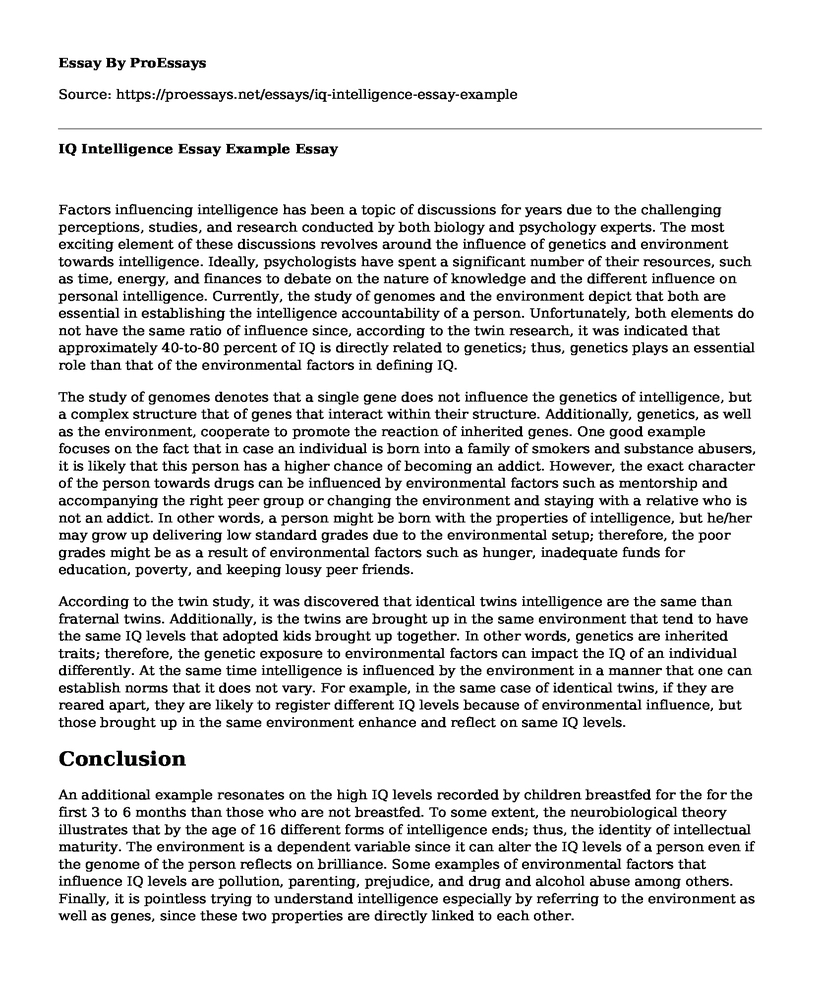Factors influencing intelligence has been a topic of discussions for years due to the challenging perceptions, studies, and research conducted by both biology and psychology experts. The most exciting element of these discussions revolves around the influence of genetics and environment towards intelligence. Ideally, psychologists have spent a significant number of their resources, such as time, energy, and finances to debate on the nature of knowledge and the different influence on personal intelligence. Currently, the study of genomes and the environment depict that both are essential in establishing the intelligence accountability of a person. Unfortunately, both elements do not have the same ratio of influence since, according to the twin research, it was indicated that approximately 40-to-80 percent of IQ is directly related to genetics; thus, genetics plays an essential role than that of the environmental factors in defining IQ.
The study of genomes denotes that a single gene does not influence the genetics of intelligence, but a complex structure that of genes that interact within their structure. Additionally, genetics, as well as the environment, cooperate to promote the reaction of inherited genes. One good example focuses on the fact that in case an individual is born into a family of smokers and substance abusers, it is likely that this person has a higher chance of becoming an addict. However, the exact character of the person towards drugs can be influenced by environmental factors such as mentorship and accompanying the right peer group or changing the environment and staying with a relative who is not an addict. In other words, a person might be born with the properties of intelligence, but he/her may grow up delivering low standard grades due to the environmental setup; therefore, the poor grades might be as a result of environmental factors such as hunger, inadequate funds for education, poverty, and keeping lousy peer friends.
According to the twin study, it was discovered that identical twins intelligence are the same than fraternal twins. Additionally, is the twins are brought up in the same environment that tend to have the same IQ levels that adopted kids brought up together. In other words, genetics are inherited traits; therefore, the genetic exposure to environmental factors can impact the IQ of an individual differently. At the same time intelligence is influenced by the environment in a manner that one can establish norms that it does not vary. For example, in the same case of identical twins, if they are reared apart, they are likely to register different IQ levels because of environmental influence, but those brought up in the same environment enhance and reflect on same IQ levels.
Conclusion
An additional example resonates on the high IQ levels recorded by children breastfed for the for the first 3 to 6 months than those who are not breastfed. To some extent, the neurobiological theory illustrates that by the age of 16 different forms of intelligence ends; thus, the identity of intellectual maturity. The environment is a dependent variable since it can alter the IQ levels of a person even if the genome of the person reflects on brilliance. Some examples of environmental factors that influence IQ levels are pollution, parenting, prejudice, and drug and alcohol abuse among others. Finally, it is pointless trying to understand intelligence especially by referring to the environment as well as genes, since these two properties are directly linked to each other.
Cite this page
IQ Intelligence Essay Example. (2022, Oct 23). Retrieved from https://proessays.net/essays/iq-intelligence-essay-example
If you are the original author of this essay and no longer wish to have it published on the ProEssays website, please click below to request its removal:
- Overview of Kathy Kelly's Life
- My Three Characteristics Essay
- Cognitive Aging: The Role of Environment and Genetics Paper Example
- Gaps in Programming for Couples Essay Example
- Compare and Contrast Earnest Becker and Erich Fromm and Their Contribution to Karl and Sigmund Freud
- Stress: Mental Health and Physical Health Linked - Essay Sample
- Essay Example on Depression: Causes, Types, and Effects







